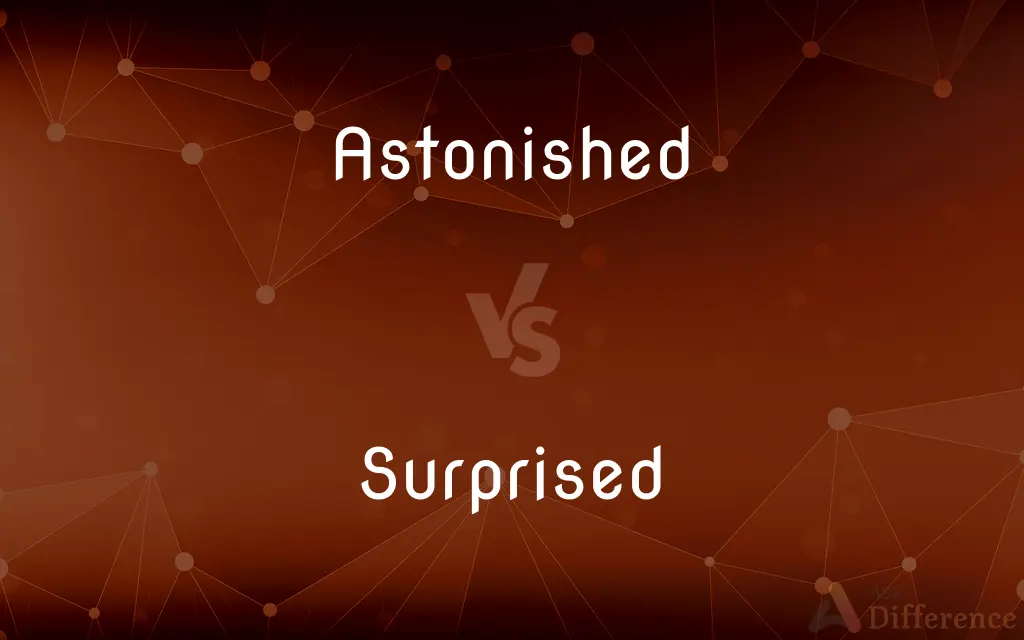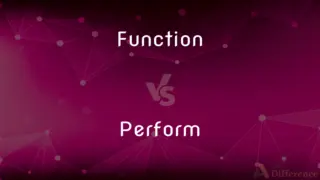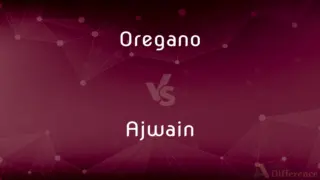Astonished vs. Surprised — What's the Difference?
By Fiza Rafique & Maham Liaqat — Updated on April 21, 2024
Astonished implies a greater intensity, often suggesting overwhelming shock or amazement, while surprised indicates a milder, often sudden reaction to the unexpected.

Difference Between Astonished and Surprised
Table of Contents
ADVERTISEMENT
Key Differences
Being astonished involves an intense level of surprise that typically includes elements of shock or disbelief. On the other hand, being surprised is a more general response that can range from mild to strong, but it doesn't necessarily convey the depth of emotion that astonishment does.
Astonishment is often used when the unexpected event or information has a significant impact, causing the individual to feel momentarily overwhelmed or at a loss for words. Conversely, surprise can be experienced in everyday situations that catch one off guard, but do not leave a lasting impression.
The expression of astonishment can involve dramatic body language or facial expressions, indicating a profound reaction. Whereas, surprise might only elicit a brief raise of the eyebrows or a quick gasp.
In literature and speech, "astonished" is used to amplify the severity or impact of an event, enhancing the narrative or emotional depth. In contrast, "surprised" is often used more casually to describe a variety of unexpected situations without the need for emotional depth.
While both terms describe reactions to unexpected events, astonishment is typically reserved for scenarios where the level of surprise escalates to an extreme, making it less common than the more frequently experienced and less intense feeling of being surprised.
ADVERTISEMENT
Comparison Chart
Intensity of emotion
Very high, involving shock and overwhelming
Variable, generally milder than astonishment
Context of use
Used in highly impactful or shocking situations
Used in everyday, unexpected situations
Expression
Dramatic, often speechless
Milder, brief facial expressions or reactions
Usage in language
Emphasizes depth of emotional impact
Describes a broad range of unexpected events
Frequency
Less common due to the intensity required
More common as it covers a wide range of events
Compare with Definitions
Astonished
Feeling or showing great surprise or wonder.
She was astonished by the vastness of the ocean.
Surprised
Feeling mild shock or astonishment at something unexpected.
He was surprised by the sudden change in weather.
Astonished
Experiencing a significant disruption of the usual expectations.
The magician left the audience astonished with his act.
Surprised
Taken unawares or startled by an unexpected event.
She was surprised to find her car missing from the driveway.
Astonished
Shocked by something unexpected and remarkable.
He was astonished at the crowd's sudden silence.
Surprised
Showing a reaction to something not anticipated.
The surprise in her eyes was evident when she received the gift.
Astonished
Overwhelmed with sudden amazement.
They were astonished to see the mountain summit above the clouds.
Surprised
Encountering the unexpected.
We were surprised to see the park so empty on a sunny day.
Astonished
Reacting with disbelief to an unforeseen event.
I was astonished to find an old friend at the doorstep.
Surprised
Experiencing a brief disturbance caused by something unforeseen.
They were surprised at the noise from the street.
Astonished
To fill with sudden wonder or amazement.
Surprised
Feeling or showing surprise
There was a surprised silence
Astonished
Amazed; surprised.
Surprised
To cause to feel wonder, astonishment, or amazement, as at something unanticipated
Thinking I was at home, she was surprised to see me in the office. We were surprised that he could recover so quickly.
Astonished
Simple past tense and past participle of astonish
Surprised
To encounter or discover suddenly or unexpectedly; take or catch unawares
She surprised him as he was reading her diary.
Astonished
Filled with the emotional impact of overwhelming surprise or shock;
An amazed audience gave the magician a standing ovation
I stood enthralled, astonished by the vastness and majesty of the cathedral
Astounded viewers wept at the pictures from the Oklahoma City bombing
Stood in stunned silence
Stunned scientists found not one but at least three viruses
Surprised
To attack or capture suddenly and without warning
Surprised the sentries in a predawn raid, wounding several.
Surprised
To cause (someone) to do or say something unintended or to be in an unintended condition
"There passed a scene ... that surprised me into courage to come forward" (Fanny Burney).
Surprised
To elicit or detect through surprise
"She occasionally surprised a look on Jemima's face" (Marcia Willett).
Surprised
The act of surprising or the condition of being surprised
Imagine my surprise on seeing you here.
Surprised
Something, such as an unexpected encounter, event, or gift, that surprises.
Surprised
Caused to feel surprise, amazement or wonder, or showing an emotion due to an unexpected event.
Surprised
Simple past tense and past participle of surprise
Surprised
Taken unawares or suddenly and feeling wonder or astonishment;
Surprised by her student's ingenuity
Surprised that he remembered my name
A surprised expression
Common Curiosities
Is astonishment always a positive reaction?
Not necessarily; astonishment can be either positive or negative, depending on the context and nature of the surprising event.
How do writers use these terms to describe character reactions?
Writers use "astonished" to convey a strong impact on characters, enhancing dramatic effect, whereas "surprised" is used for less intense narrative moments.
What types of situations typically cause astonishment?
Situations that are highly unusual, shocking, or surpass normal expectations often cause astonishment.
What differentiates being astonished from being surprised?
Astonishment implies a deeper, more intense reaction to something extremely unexpected, while surprise covers a broader, often milder reaction to the unexpected.
Are there synonyms that convey a similar sense as astonished?
Yes, words like amazed, flabbergasted, and stupefied convey similar levels of intense surprise.
What facial expressions are associated with surprise?
Common expressions include widened eyes and a slightly open mouth.
Can surprise evolve into astonishment?
Yes, if the unexpected event proves to be extraordinarily impactful or shocking, a surprise can intensify into astonishment.
How can one tell the difference between surprise and astonishment in a person's reaction?
The intensity and duration of the reaction are key indicators, with astonishment being more profound and lasting longer.
Is it common to use astonished in everyday conversation?
It is less common than surprised, as it refers to more extreme situations.
How do children typically react when they are surprised or astonished?
Children may express surprise or astonishment through loud exclamations or physical gestures, showing their immediate reaction to unexpected events.
Share Your Discovery

Previous Comparison
Function vs. Perform
Next Comparison
Oregano vs. AjwainAuthor Spotlight
Written by
Fiza RafiqueFiza Rafique is a skilled content writer at AskDifference.com, where she meticulously refines and enhances written pieces. Drawing from her vast editorial expertise, Fiza ensures clarity, accuracy, and precision in every article. Passionate about language, she continually seeks to elevate the quality of content for readers worldwide.
Co-written by
Maham Liaqat













































